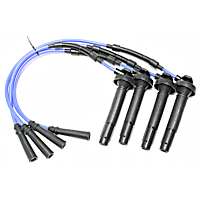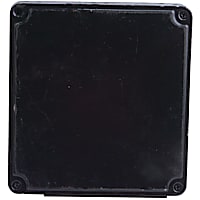An engine misfire is a common drivability problem that car owners may experience at one point. Once your vehicle’s primary computer detects an engine misfire, it will most likely turn on the check engine light.
There are several OBD-II diagnostic trouble codes related to engine misfires. In this article, we will talk about the OBD code P0307.
What Does the P0307 Code Mean?
Diagnostic trouble code (DTC) P0307 stands for “Cylinder #7 Misfire Detected.” It indicates that your vehicle’s cylinder #7 is misfiring. This means that incomplete combustion is happening inside the cylinder.
Cylinder number 7 refers not to the seventh cylinder in the firing order, but the cylinder numbered “7” in the arrangement of cylinders on the engine.

Cylinder number 7 refers not to the seventh cylinder in the firing order, but the cylinder numbered “7” in the arrangement of cylinders on the engine.
– Richard McCuistian, ASE Certified Master Automobile Technician
Remember that the efficient burning of air and fuel is essential to engine operation. Without the proper combustion of the air/fuel mixture, the engine won’t run properly or won’t run at all.
If you need help locating cylinder #7, read our explanation about cylinder location and firing order. An in-depth understanding of cylinder misfires can also help you correctly diagnose the issue and come up with a solution if you’re planning a DIY fix.
Note: The definition of Code P0307 may vary depending on the vehicle manufacturer. It is best to consult your trusted repair manual or repair database for the exact code definition.
P0307 on Some Ford Vehicles
Code P0307 may appear on some Ford vehicles. On a 2013 Ford F-150 XL 5.0L V8, for example, the code appears because of the following conditions:
- Issues with the ignition system
- Faulty fuel injectors
- Running out of fuel
- Issues with the EVAP purge valve
- Fuel pressure problem
- Issues with the EVAP system
- Issues with the Exhaust gas recirculation (EGR) system
- Base engine problem
- Misfire monitor neutral profile correction has not been relearned since the last mechanical repair
For this specific vehicle, Ford also notes that the malfunction indicator lamp (MIL) blinks once per second when a misfire severe enough to cause catalyst damage is detected. If the MIL is on steady state due to a misfire, this indicates the threshold for emissions was exceeded and caused the vehicle to fail an inspection and maintenance tailpipe test.
What are the Possible Causes of the P0307 Code?
Since engine misfire is a very broad problem, there are many triggers that may cause this to happen. Here are some causes of an engine misfire:
- A bad ignition coil, faulty spark plug wire, or failed spark plug wire.
- A faulty fuel injector or problem with the injector’s circuit.
- An internal engine problem, such as a leaking valve or worn camshaft lobe.

What are the Common Symptoms of the P0307 Code?
Keep in mind that although the P0307 code is a generic trouble code, it may present different symptoms depending on your vehicle’s year and make, and the exact cause of the misfire.
Here are the common symptoms associated with the P0307 code:
- Hard Starting Engine
- Engine Hesitation
- Check Engine Light
- Lack of Engine Power
- Jerking from the Engine
- Rough running
How to Diagnose the P0307 Code
As mentioned, a lot of factors can lead to engine misfires. It may sometimes be difficult to diagnose and determine what is really causing the fault. It is always the best option to bring your vehicle to an auto repair shop for proper diagnosis.
However, if you have the DIY repair skills to solve this problem yourself, here is a video you can watch to understand the code more:
How to Fix the P0307 Code
Diagnostic and repair procedures for an engine misfire in cylinder #7 may vary depending on your car’s year, make, and model. For example, repair steps for a P0307 in a Chevy may vary from a P0307 in a Ford.
Since there is no universal fix for this code, it is best to leave the job to a trusted professional, especially if you are not well-versed with engine repair. However, if you have the skills to fix this code yourself, you can use online auto repair sources and guides to identify what procedures are compatible with your vehicle. To help you with your repair works, you may also get an ALLDATA single-vehicle subscription.
Where to Get a New Fuel Injector for Your Vehicle
A faulty fuel injector is one of the most common causes of the P0307 code. If you keep driving your car without replacing the malfunctioning injector, it might lead to engine issues that may cost more to repair. Instead of ignoring the problem in the hopes that it will go away, order a replacement fuel injector from CarParts.com.
Enjoy simple and easy online shopping for fuel injectors here at CarParts.com. Find the right part by selecting your vehicle’s details in our helpful vehicle selector. We only source our fuel injectors from the most trusted manufacturers in the industry, ensuring you get your money’s worth from your replacement part. And if you live in the continental U.S. and place your order by 12 p.m. ET, you don’t have to wait more than a few business days for your new parts to arrive at your doorstep.
Don’t wait for your fuel injector to break down before getting a new one. Check out our wide selection of quality fuel injectors now at CarParts.com.
Products Mentioned in this Guide
Any information provided on this Website is for informational purposes only and is not intended to replace consultation with a professional mechanic. The accuracy and timeliness of the information may change from the time of publication.


 Ignition Coil
Ignition Coil
 Fuel Injector
Fuel Injector
 Spark Plug Wire
Spark Plug Wire
 Engine Control Module
Engine Control Module


















